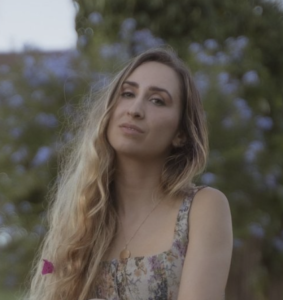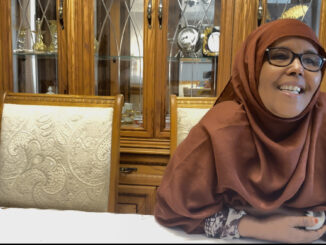Small Shop, Big Impact
In a small shop on Broadview Avenue, Toronto, Omowunmi Badmus stocks her shelves with household items. She watches as customers take in her space, looking at what she’s put on her shelves. Each of the products are made of biodegradable material, such as bamboo. They are sold with the main purpose of helping to save the environment. Simple, everyday products with so much power and potential for change.
Omo Bamboo is a zero-waste shop. Quality is a priority – and prices are geared towards affordability. Badmus shares her passion for sustainability by selling eco-friendly products to Torontonians. According to the National Oceanic and Atmospheric Administration’s annual climate report, the temperature of both the land and ocean combined has increased by more than double in 2023 from what it was in 1981. This fact haunts Badmus. It also fuels her passion to combat climate change one product at a time.
Badmus spends each day trying to slow the world’s rapidly changing climate. She splits her time operating the store Tuesday to Friday, while bringing bags full of products to markets Saturday to Monday. Omowunmi Badmus says Omo Bamboo and its goods serve a distinct purpose: to get others on board the battle against climate change.
Rise of a Bamboo Shop
Omowunmi Badmus has always lived a zero-waste lifestyle because she says the planet is far too valuable to be taken for granted. She’s had the environment at heart ever since she was a young girl in Nigeria. Badmus says it’s how she was raised.
Omowunmi Badmus arrived in Canada at a very young age, with opportunity all around her. She didn’t know which path in life she wanted to take. What excited her most was being in a new country with endless opportunities.
In 2018, Badmus saw a toothbrush made of bamboo. She thought it would be easy for her to start making these herself, along with other household items. She decided to start making and selling many different bamboo-based products to help her customers live as close to a zero-waste lifestyle as possible.
Badmus brought two briefcases of her merchandise to the market to see if anyone would be interested. To her surprise, she sold out quickly. Badmus went home full of excitement, immediately calling her parents to tell them her new life goal: to open an eco-friendly store of her own.
After some initial funding struggles, her business took off. She won an award for best gift shop in Scarborough in 2021. The process of constant hard work and dedication finally paid off.
Omo Bamboo has made a name for itself. Customers have been flooding in with the intention of doing their part to help keep the world safe from waste. She says it takes a small amount of effort to help the environment. Omowunmi Badmus sells household items at an affordable price to make it easier for customers to do their part.
Healing the Earth
Science tells us the earth is facing a climate crisis. Global warming, plastic pollution, and food waste are all factors eroding planetary health. According to Statistics Canada, 50 million tons of food is wasted in this country every year. At least a third of that could be saved and sent to people in need across the nation.
Environmentalists blame much of the planet’s problems on everyday decisions humans make or don’t make. They urge people to do more. Take for instance, backyards. Digging a rain garden could provide a home for wildlife. Rain gardens filter 90% of chemicals. If you do the math, it adds up to 30% more filtration than the average lawn.
Picking up plastic around the neighborhood is another way to pitch in. Plastic waste is one of the biggest threats to wildlife and our ecosystems.
Jennings Ingram is an environmentalist and eco-marketer for Jennings Creative Agency. Her passion? Saving the planet! Ingram’s social media presence reaches thousands of people. She says we all need to chip in when it comes aiding Mother Nature.

From Seneca to Artevelde
Let’s head to Belgium to see how local initiatives, an ocean apart, are contributing to a global circular economy by designing out waste, repurposing or regenerating.
Saving Food
‘Let’s Save Food!’ is an organization against food waste. Volunteers bring together food surpluses in Ghent to sell to people in need for next to nothing. Everyone can take as much as they want for as low as one euro. That’s just shy of $1.50 (CAD).
In the heart of Ghentbrugge, a diverse group of residents join forces to combat food waste. They strive to give perfectly edible food a second chance to those who are financially strapped. The organization also wants to tackle the negative impact on the environment and climate. Loss of food equates to a loss of energy, water, space, and a stable climate.
That's why 'Let's Save Food!' has developed a local system in which they collect food surpluses at the neighborhood level and share them with people in need. Everyone is welcome to take part, and they encourage local associations and charities to use and distribute the food collected.
'Let's Save Food!' asks for a voluntary contribution for the best food products to cover costs. It also offsets the environmental costs of the rescued food through support for biodiversity and climate projects. Their goal is a more sustainable future, where every piece of food counts and nothing goes to waste.
That’s Lisa De Pachter mission. She has been volunteering for ‘Let’s Save Food!’ for a year and a half. She comes three to four times a week to help with food distribution. She has also volunteered in the past and has a heart for justice. The above story showcases her passion.
Eco-Friendly Fries
Everyone knows her as just – Lily, (kind of like Drake). For 43 years, this master of chips has been frying fries in her frietkot (chip shop) on Vlaamsekaai in Ghent. She started when she was 16. It’s no surprise she is still super enthusiastic about her job. ‘Frituur Lily’ is not just any fry shop. Lily is a strong advocate of zero waste and tries to impose this on her customers.
The sauce is not put in separate plastic containers, you must bring your own glass jars. Plastic forks are also avoided. In this way, Lily hopes to do her bit. She also tries to raise awareness among her customers.
Lily was brought up environmentally conscious, not by her parents but from the Plastic Soup Foundation. It’s an organization dedicated to reducing waste in the seas.
“I know I can’t solve everything, but every little bit helps,” says Lily.
Most of Lily's customers are regulars who always bring their own bags and jars. For some who come there for the first time, it takes getting used to. “Sometimes I do get an angry look, but I don’t care,” stresses Lily. For her, doing her part to save the planet is worth a dirty look or two.
Meet the Team

Adam El-Zein

Joseph Macri

Jaylen Clarke

Xander Lievens

Sian Oosterlinck

Floris Dezutter





Be the first to comment